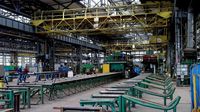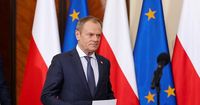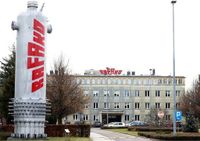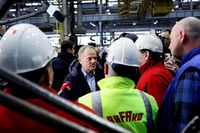On April 15, 2025, during the European Forum of New Ideas (EFNI) in Warsaw, Prime Minister Donald Tusk announced a significant shift in the future of Rafako, a company that has long been a staple in the Racibórz region of Poland. Once a leading manufacturer of energy equipment, Rafako declared bankruptcy in December 2024, but Tusk's recent statements suggest a potential rebirth as an armaments producer.
"We have decided to invest some money to maintain this place," Tusk stated, emphasizing the government's commitment to revitalizing Rafako's operations. He noted that there is no reason preventing the company from transitioning from its traditional boiler production to large-scale armaments manufacturing. "Rafako, Racibórz, Silesia - this could be a place where production for the defense of Poland or Europe can reach a large scale," he added.
The announcement comes in the wake of a series of financial struggles for Rafako. After filing for bankruptcy in September 2024 due to financial illiquidity, the company's situation worsened when JSW Koks, a subsidiary of Jastrzębska Spółka Węglowa, withdrew from mediation efforts and demanded substantial financial guarantees related to a problematic construction contract. This led to the District Court in Gliwice declaring Rafako bankrupt just a few months later.
As a result of these financial difficulties, a receiver was appointed to manage the company, and on January 23, 2025, it was announced that up to 699 employees would face layoffs by the end of February. The news of layoffs struck hard in the Racibórz community, as Rafako has been one of the largest employers in the region for decades. In February, employees bid farewell to the plant with applause, highlighting the emotional weight of the situation. Jarosław Balcer, a former Rafako employee, lamented, "We see day by day how a company with a 75-year tradition is deteriorating. The value of Rafako is its people. If they leave, only the halls and machines will remain."
Despite these challenges, Tusk's vision for Rafako includes a pivot toward defense production. He pointed out that there are ample opportunities in Silesia for retooling production facilities, citing the example of Huta Częstochowa, which successfully transitioned its operations under state protection after facing bankruptcy. "We will look for simplified procedures, just as was done with Huta Częstochowa," Tusk explained.
In March 2025, the Ministry of State Assets announced it was actively seeking solutions to keep Rafako operational. The agency is reportedly in discussions with potential investors to develop a financial model that would allow the company to continue its existence. In early April, it was revealed that Polimex Mostostal, an engineering and construction company, expressed interest in partnering with the State Development Agency (ARP) and TF Silesia to acquire selected assets from Rafako.
Tusk's remarks at the EFNI signal a broader strategy to leverage Polish and European funding for armaments production as a matter of national security. He remarked, "It has become clear that continuing production as Rafako once knew it is impossible. But there are Polish and European funds that should be allocated for armaments production in the interest of state security." This shift not only aims to preserve jobs but also to reposition Rafako as a key player in Poland's defense industry.
The Prime Minister's commitment to Rafako's future reflects a growing recognition of the need for domestic production capabilities in the face of geopolitical uncertainties in Europe. With tensions rising and defense spending increasing across the continent, Tusk's initiative could position Poland as a more self-reliant nation in terms of armaments.
The potential transformation of Rafako into an armaments manufacturer has garnered mixed reactions. While some community members express hope for job preservation and economic revitalization, others remain cautious, recalling the company's turbulent past. The transition will require careful planning and execution to ensure that the new direction is sustainable.
As the government moves forward with its plans, the eyes of the region and the nation will be on Rafako. Will this historic company successfully reinvent itself, or will it succumb to the challenges that have plagued it in recent years? Only time will tell, but Tusk's announcement has certainly set the stage for what could be a pivotal moment in the history of Rafako and the Silesian economy.






